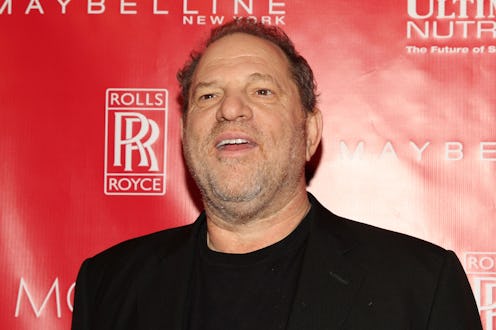Entertainment
The Weinstein Company Has Officially Filed For Bankruptcy — But That's Not All

Months after a spate of sexual assault and harassment allegations emerged against Harvey Weinstein, the film producer's business, the Weinstein Company, has filed for bankruptcy. Weinstein has previously apologized for behaving in a way that caused his colleagues pain, though has said via a spokesperson that "any allegations of non-consensual sex are unequivocally denied". According to the BBC, in filing for bankruptcy, the Weinstein Company also said that it would release any survivors of alleged sexual misconduct from any non-disclosure deals that prohibited them from speaking on the issue.
The BBC reported that the once highly successful film company filed for Chapter 11 bankruptcy on Monday. The company also struck a deal with a private equity firm, which will purchase its assets if the deal is approved in court.
A statement released by company chairman Bob Weinstein noted that it was pleased with the outcome:
While we had hoped to reach a sale out of court, the board is pleased to have a plan for maximising the value of its assets, preserving as many jobs as possible and pursuing justice for any victims ...
The Company also elaborated on its decision to release individuals from non-disclosure agreements, saying that it constitutes, "an important step toward justice for any victims who have been silenced by Harvey Weinstein." The Company also added that it hopes that the removal of the non-disclosure agreements will empower people to speak out about their experiences, if they so choose:
... Since October, it has been reported that Harvey Weinstein used non-disclosure agreements as a secret weapon to silence his accusers. Effective immediately, those ‘agreements’ end ... No one should be afraid to speak out or coerced to stay quiet. The Company thanks the courageous individuals who have already come forward. Your voices have inspired a movement for change across the country and around the world.
According to the New York Times, ending the company's non-disclosure agreements has long been advocated by the New York Attorney General, Eric Schneiderman, who filed a civil rights lawsuit against the company back in February. Upon the company's announcement that it would be ending the non-disclosure agreements, Schneiderman released a statement, saying:
This is a watershed moment for efforts to address the corrosive effects of sexual misconduct in the workplace. The Weinstein Company’s agreement to release victims of and witnesses to sexual misconduct from non-disclosure agreements -- which my office has sought throughout this investigation and litigation -- will finally enable voices that have for too long been muzzled to be heard.
Schneiderman also indicated in his statement that his office will continue to move forward with its civil rights lawsuit against the company. The lawsuit alleges that the Weinstein Company violated New York's "civil rights, human rights and business laws," according to Lorena Blas of USA Today.
Beyond the company's legal issues, Weinstein is also facing a host of individual legal challenges. As the New York Times reported, the producer is facing several civil suits, including one in which he is being sued for alleged sex trafficking. Weinstein has denied these allegations. The Times also reported that the producer is the subject of possible criminal cases in three different cities: New York, Los Angeles and London.
The Los Angeles Times reported that it is unclear how long the entire bankruptcy process will take. However, Jack Tracy, a legal analyst for Debtwire, a bankruptcy information service, noted to the outlet that it would be in the company's best interest to move the process forward as rapidly as possible. "The longer this takes, the more the pressure's going to build from their creditors, the more lawsuits will be filed," Tracy told the paper.